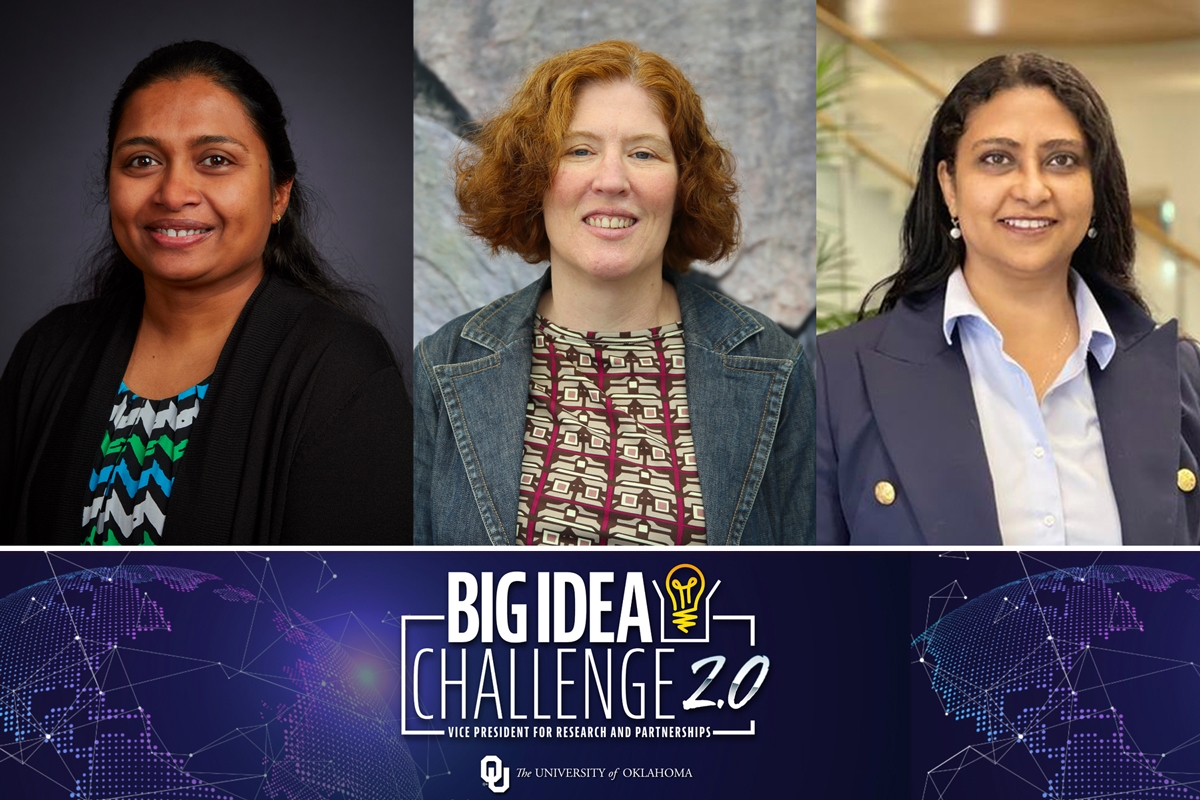Three research teams will receive funding from the Office of the Vice President for Research and Partnerships to support innovative research into global grand issues. This marks the second round of the Big Idea Challenge, a program designed to foster cross-disciplinary research projects. These projects are focused on solving major worldwide challenges and are expected to attract substantial external funding in the future.
OU Vice President for Research and Partnerships Tomás Díaz de la Rubia said, “Not only will these three projects position the University of Oklahoma as a leader in genetic, artificial intelligence and climate research, but they will showcase our faculty’s ability to collaborate through interdisciplinary teams and provide results that can transform how people worldwide address these important global challenges.”
The projects being funded are:
“Developing Error-Proof CRISPR-Cas9 for Treating Genetic Disorders”
Led by Rakhi Rajan, an associate professor in the Department of Chemistry and Biochemistry, with co-principal investigators from the OU Health Sciences Center, the Gallogly College of Engineering and the Dodge Family College of Arts and Sciences, this project aimes to develop safer and society-approved treatments for genetic eye disease, which can be translated to other genetic disorders.
“This funding unites diverse expertise ranging from CRISPR-Cas technology development, genetic eye disease models, artificial intelligence-based DNA and protein sequence analysis to improve the CRISPR-Cas technology, development of cost-effective delivery approaches for treatment, and understanding societal perceptions of this technology and educating the society about the technology,” Rajan said. “Large-scale efforts such as ours are pivotal in developing error-free and equitable treatment options for genetic disorders. With the first clinical use of CRISPR-Cas9 technology being approved by the FDA in Dec. 2023, our team hopes to create CRISPR-Cas9-based treatment for genetic eye disorders with our combined efforts.”
“Neo-SCAI: Cancer Neoepitope Identification from Single Cell Genomics Data using Artificial Intelligence Algorithms”
Marmar Moussa, an assistant professor for computational biology and bioinformatics, the School of Computer Science, will lead this project alongside co-principal investigators from the Dodge Family College of Arts and Sciences, the Gallogly College of Engineering, the OU Health Sciences Center and the Oklahoma Medical Research Foundation. Moussa’s project will employ artificial intelligence techniques to develop an experimentally validated framework to identify neoepitopes – cancer-specific peptides derived from mutations and presented on the surface of cancer cells, making them promising targets for the immune system for more effective personalized cancer immunotherapy.
“This support opens up an incredible opportunity for our team to combine artificial intelligence and cancer immunotherapy research,” Moussa said. “At the core of precision medicine, especially in cancer, it is important to identify highly personalized targets for treatments that minimize toxicity and side effects. Developing neoepitope identification methods is a step toward this goal. I can't wait to start this effort with this incredible trans-disciplinary team.”
“Climate Information and Actionable Timescales for Climate Security in Latin America”
This project is led by Kathy Pegion, an associate professor and Williams Chair in the OU School of Meteorology, alongside co-principal investigators from the David L. Boren College of International Studies, the OU School of Meteorology, the Dodge Family College of Arts and Sciences, the Gaylord College of Journalism and Mass Communications, the College of Atmospheric and Geographic Sciences and the Oklahoma Aerospace and Defense Innovation Institute. The goal of Pegion’s team is to develop subseasonal and seasonal forecasting to better anticipate risks of climate shock and use regional knowledge and established partnerships to co-produce useable and actionable information and tools for partners in Guatemala, Brazil and Peru.
“This funding will allow us to use our transdisciplinary expertise OU to improve access to advance information of potential weather-climate hazards that can impact people in Latin America,” Pegion said. “Our hope is that this work will positively impact society by reducing food, water and infrastructure insecurity that threatens livelihoods, exacerbates conflicts and forces people to leave their homes.”
Learn more about the Big Idea Challenge and other internal funding opportunities.


